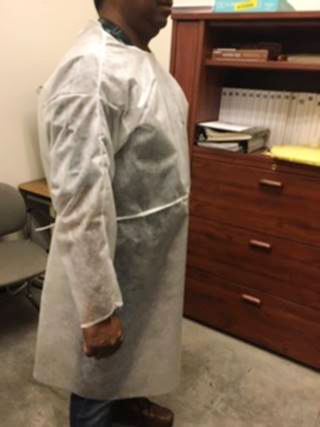
A Corrections employee models the one-size-fits-all protective medical gown prototype developed by Correctional Industries at Coyote Ridge Corrections Center. Photo courtesy of Department of Corrections
TUMWATER – The Department of Corrections’ Correctional Industries (CI) will begin producing protective gowns in response to the nationwide shortage. CI has developed an approved prototype and expects to start production in the coming days at its textiles shop located at the Coyote Ridge Corrections Center (CRCC) in Connell, Washington. CI will then expand production to textiles shops at Airway Heights Corrections Center (AHCC), Clallam Bay Corrections Center (CBCC) and Washington Corrections Center (WCC).
Once fully operational, CI estimates it will produce 5,000-6,000 gowns per day with 12 staff and 160 incarcerated workers. The Washington State Department of Corrections Emergency Operations Center will coordinate with theWashington State Emergency Operations Center on distribution of the gowns.
“I’m proud our CI team can contribute to the COVID-19 response in such a meaningful way,” said Corrections Secretary Stephen Sinclair. “When we learned of the national shortage of protective gowns, CI sprang into action to develop a prototype to begin manufacturing these gowns. I’m proud of their ingenuity and quick action.”
CI operates within all correctional facilities throughout Washington and trains approximately 2,400 incarcerated individuals. CI provides training and workforce development opportunities to incarcerated individuals through work programs modeled after the real world, focusing on developing both technical and social skills.
Linking basic skills, vocational skills and on-the-job training prepares incarcerated individuals for employment when they reenter into the community.
“CI helps to transform lives and increase successful reentry through training and mentoring by maintaining and expanding work training programs for incarcerated individuals,” Sinclair said. “This helps them develop marketable job skills and promotes positive work ethics. In this time of crisis, this work gives our CI workers purpose by helping them to contribute to society and give back.”
A 2015 study by Washington State University (WSU) determined that those who participate in CI work programs were significantly less likely to commit new offenses leading to conviction and significantly more likely to remain in the community longer without committing a new offense.
Once back in the community, formally incarcerated individuals who participated in CI programs were more likely to have a legitimate source of income, earn more than $1,000 per month, and earn an average of $1.03 more per hour than those who did not participate.
For the latest news about Corrections’ response to COVID-19, including frequently asked questions (FAQs) for staff and the public, please visit the Department’s COVID-19 resource page.



